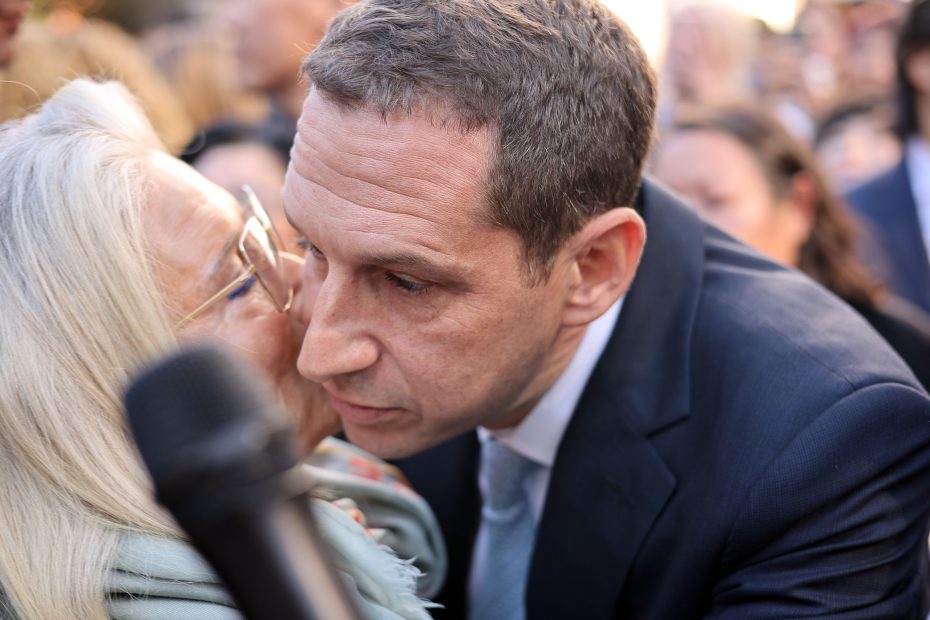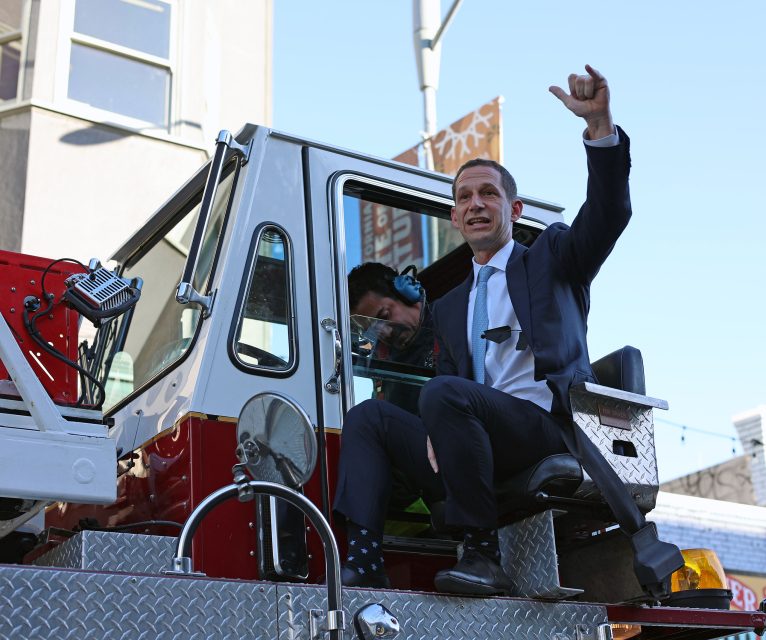In the days leading up to today’s inaugural celebrations for Mayor Daniel Lurie, City Hall and Civic Center Plaza were festooned with blue and gold banners depicting sun-like beams. Frankly, it looks a little bit like the Kazakh flag, but we’re relatively certain this isn’t the impression Team Lurie was going for.
Rather, these banners are subtle, but the underlying message isn’t: A new day, a rising sun — it’s morning again in San Francisco. Cliched, even a bit cheesy, but here’s the thing: It’s true. Add to whatever other myriad privileges Lurie has enjoyed in his life, the privilege of following London Breed in this job.
San Francisco’s new mayor has never held conventional employment; when Lurie today raises his right arm and takes his oath of office, he’ll be sworn into the most conventional job he has yet held — and he doesn’t even plan to keep the money. We are left searching for indicators in his personal and professional history to hint at where he intends to take San Francisco — let alone how he would manage to take us there.
No matter: Government official after government official welcomed this transition; one veteran City Hall denizen compared Lurie’s entrance and Breed’s exit to “a monsoon sweeping across the Gangetic Plain after months of 45-degree Celsius weather.”
For the American audience, 45 degrees Celsius is 113 degrees Fahrenheit. This is stifling and unbearable — and, long before November, so was the outgoing mayor. Breed’s governmental master plan all too often appropriated the vaunted strategies of SODDI (“Some Other Dude Did It”) and BEE (“Blame Everyone Else”) deployed by any number of defense attorneys who place ads in bus shelters.
Breed, farcically, called for large-scale governmental reform a mere six-and-a-half years into her mayoral term and openly pined for the days when she had emergency powers and checks and balances didn’t apply to her. Her reelection pitch turned out to be I cannot fix the problems — and the voters concurred. Enter Lurie.
It’s morning again in San Francisco…
To borrow the line from Richard Nixon, San Francisco won’t have London Nicole Breed to kick around anymore. On the other hand: There’s never been a better time to kick. Unlike Willie Brown, Breed did not seed the government with her foot soldiers, so as to ease into a decadeslong career as an influence peddler. Any disgruntled person with a story to tell — who held their tongue because the mayor of San Francisco is clothed in immense power — can now line up and do their best imitation of Ray Wersching.
Actually, forget Ray Wersching. We may yet see a veritable kick line of disgruntled Rockettes. Every kick will extend Lurie’s mayoral honeymoon.
Breed, on the last full day of her tenure, sent out a press release noting that crime in San Francisco had fallen to 20-year lows, with precipitous drops in homicides and car break-ins. That didn’t do her much good with the voters, but it’s not a bad place for Lurie to start out: Crime is, statistically, on the wane. And, with a new mayor in office, voters may — elusively and magically — feel safer too.
So, the monsoon analogy isn’t a bad one. Rather than high-decibel hectoring and blame-deflection and calls for municipal autocracy, our new mayor’s C.V. — for what it’s worth — indicates an overriding desire to get people into a room and act as a facilitator. But banners depicting a driving rainstorm would probably be ill-received. It’s morning again in San Francisco was likely the better choice.
 Daniel Lurie embraces his mother Miriam Haas after his acceptance speech. Photo on Nov. 8, 2024 by Abigail Van Neely.
Daniel Lurie embraces his mother Miriam Haas after his acceptance speech. Photo on Nov. 8, 2024 by Abigail Van Neely.
Does Daniel Lurie need to radically change San Francisco to succeed? Or does he just need to do the basics — things like cleaning the streets and imparting a feeling of security that every denizen of every city would want, especially those paying ludicrous amounts of money for the privilege of residing in this one?
The answer, of course, is yes. In San Francisco, it will require radical change to do the basics.
While our aspirational overlords who poured millions into the most recent election cycle bemoaned our mayor’s inability to summarily hire and fire department heads, San Francisco has far more pressing issues regarding would-be department heads not wanting to work for us in the first place — and an inability to hire anyone. Whether it’s cops or sheriff’s deputies or nurses or social workers or teachers, San Francisco’s onerous hiring processes and sclerotic bureaucracy drive away qualified candidates or draw out the process interminably enough that other municipalities can swoop in and poach them.
Civil service reform — it ain’t sexy. It ain’t a campaign promise sort of thing. But think of it — and so many other devils in San Francisco’s ocean of details — like the nuts and bolts holding together a car. Nobody talks up the integrity of the nuts and bolts as a selling point. Nobody gives them a moment’s notice (except when you, incongruously, find a bolt sitting on the floorboard of a brand-new vehicle). But if they’re faulty, the car comes to grief.
Lurie, a government naif, has surrounded himself with more experienced people. None of them, through temperament or practice, appear to be the sort to propose revolutionary new ideas.
“But we don’t need more new ideas,” counters another longtime government official. “We need someone who is going to sit down and do the boring part of the job. Daniel Lurie is boring: He is going to be there and manage the already shit-ton of ideas; you need a manager willing to do the hard work and roll up his sleeves and regularly meet department heads — other than yelling at them — and pick up the phone and call the legislative branch.”
How that will work out remains to be seen. But how it was working out for the past six-plus years was a known commodity. Again and again regarding the outgoing administration we wrote that you cannot legislate a solution to a problem that is fundamentally a management problem. It requires good management.
Truth be told, San Francisco has been poorly run for a long, long time. And that is due, in large part, to broken process issues. But it’s also due to talent and vision issues. The Lurie Administration can now take a crack at all of the above. It can make a play at that elusive good management.
 On a Nov. 8 victory lap in the Mission, Mayor-Elect Daniel Lurie hitches a ride. Photo by Abigail Vân Neely
On a Nov. 8 victory lap in the Mission, Mayor-Elect Daniel Lurie hitches a ride. Photo by Abigail Vân Neely
Lurie’s most visible move prior to the inauguration was to rejigger the mayor’s office and bring in policy chiefs — a 21st-century spin on the old deputy mayor system.
On the one hand, this reduces the insane number of people reporting to the mayor. It could give the city’s chief executive, especially one with no prior experience in a similar role, greater ease in managing the city. It also provides high-level positions for experienced people with deep connections in local and regional governance.
On the other hand, it could introduce an extra layer of bureaucracy in a city already replete with it. It could neuter the role of chief of staff, create a cadre of plenipotentiaries fighting to adequately fund their areas of oversight and enable skilled fixers to play policy chiefs off against one another.
And, on the third hand, rolling out these appointments every day, like a bureaucratic advent calendar, might bring a bit too much attention to the new mayor and the intractable problems he aims to solve — which will not be remedied overnight.
But let’s, for the sake of optimism, say this setup makes things better. Let’s say it allows the mayor to more efficiently manage the city. It still won’t improve the city’s outlook — it’d be a bit like tinkering with the 311 system but not fixing the underlying problems being reported. But you’d be informed of them that much more efficiently.
What are the problems facing San Francisco? As Joan Rivers would put it, “Can we talk?” San Francisco’s downtown office core still too much resembles the quasi-abandoned streets that hosted the final showdown in “Yojimbo;” the Municipal Transportation Agency is running on fumes and all anyone seems to give a damn about is cable cars; the city is facing down a massive state-mandated rezoning effort and an even more massive budget deficit; and, for good measure, the public school system is still teetering on the brink.
Hiring cops, cops, cops has been proposed as the cure for all that ails San Francisco — but the most recent academy class started out with 45 officers and graduated just 11. They could all fit in that new Toyota van, with room for a friend.
One veteran City Hall denizen compared Lurie’s entrance and Breed’s exit to “a monsoon sweeping across the Gangetic Plain after months of 45-degree Celsius weather.”
Oh, also, the nation will this month be handed to a lizard-brained kleptocrat, with every reason, political and personal, to wreak havoc on this city. In case you were wondering, the Federal Emergency Management Agency (FEMA) awarded San Francisco $148 million during the pandemic — but $267 million in submitted claims has not yet been reimbursed. But — get this — it’s within FEMA’s authority to not only stiff the city for those promised payments but to claw back the money it has already awarded.
So, that’s $415 million — that the city has already spent — that could be yanked away on a whim. That’s a fair bit of money. Enough for the city to buy toilet paper into the 25th century — assuming there’ll still be a San Francisco (or toilets).
That’s the sword of Damocles hovering over this city. If anything, there are dangling swords, plural, to deal with. Daniel Lurie is facing challenges no San Francisco mayor ever has. The question isn’t if he’s up to it but, rather, if anyone could be up to it. Lurie impressed voters as a nice and decent man — but, considering the state of the budget deficit, people will be hurt. Powerful constituencies will be angered. He will have to make difficult decisions of the sort he’s surely never made before.
But today? It’s a new day, a rising sun — it’s morning again in San Francisco. And after that? The deluge.
Copyright for syndicated content belongs to the linked Source link






Commanders HC Dan Quinn has strong comments regarding Deebo Samuel – Sports Illustrated